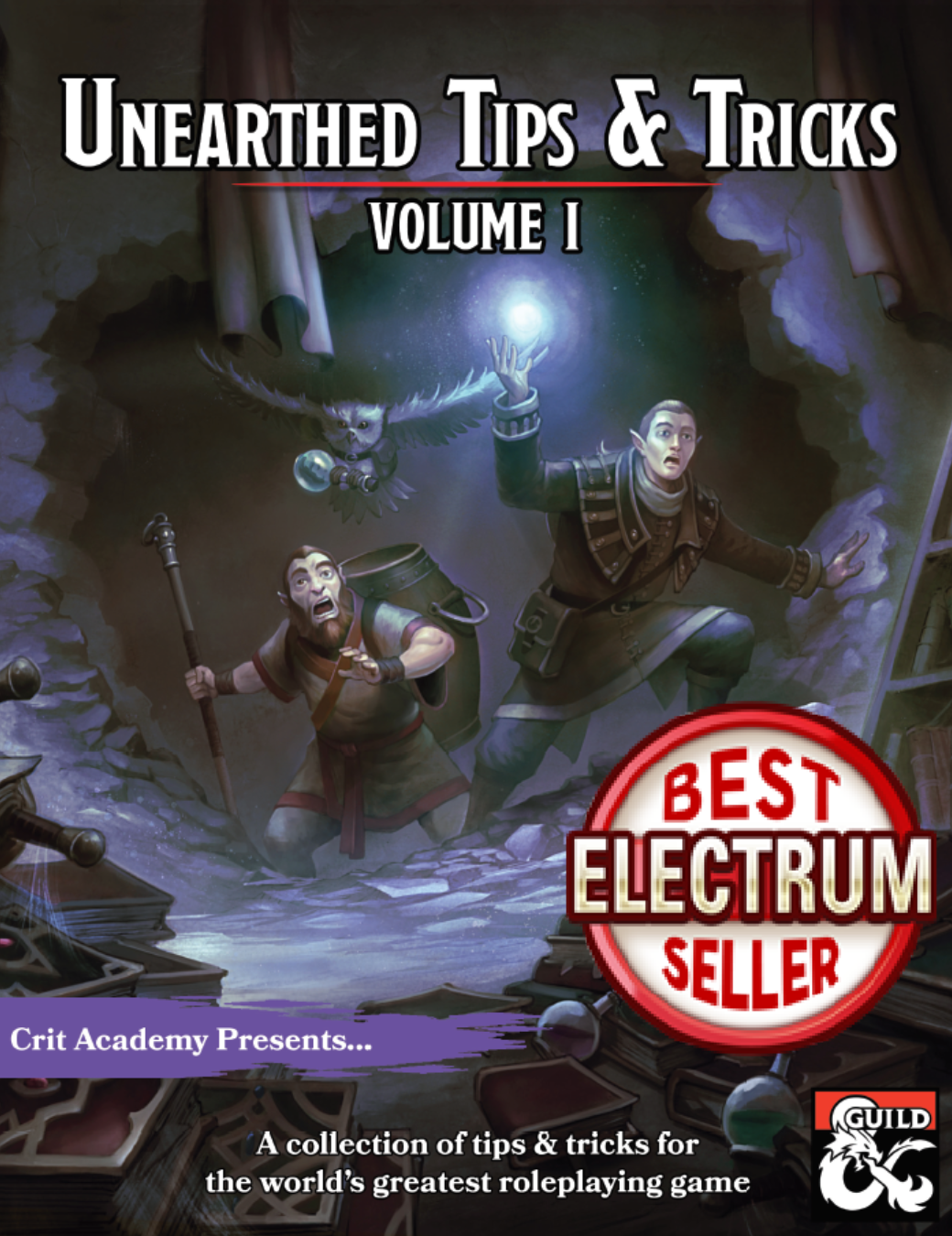D&D: 5 Tips on How to Be a Better Player in Dungeons & Dragon Volume 3
Art: Compliments of Wizards of the Coast
Click here to get Notified and Join our Live D&D Discussions Sundays @ 7pm Eastern!
How do I become a better Dungeons & Dragons player?
This isn’t a question many players ask themselves. How do I become a better Dungeon Master? This is a question almost every DM asks themselves. Why is it that making sure that the game is fun rests solely on the DM? Don’t they have enough work to do? Before I made the Crit Academy show, I asked myself this question. Combined with some other thoughts, a show dedicated to providing guidance to Dungeons and Dragons to both players and DMs was born. Since then over 250 episodes chock full of DM and Players tips has been created.
So, if you’re looking for a few ways to not only take some weight off your DMs shoulders but also make the game more fun for everyone involved, then check out this list of
“5 Tips on How to Be a Better Player in Dungeons & Dragons”.
Accept Limits
You’ve joined a new group. You don’t know anything about the campaign, but you’ve already got a character concept. You’ve got your race picked out, your class, your alignment, you’ve already rolled for your stats, and you’ve been looking over the latest Unearthed Arcana.
You’re so excited to play this character.
Well, when you get together with the group for Session Zero, you hear some terrible news: one or more of your character choices aren’t allowed in this campaign. Maybe you can’t play a Warforged in this campaign. Maybe the group is using Point Buy instead of rolling for stats. Maybe this is going to be a low magic campaign and you can’t play the spellcasting class you wanted. This means the DM is telling you that you can’t use that character you were so excited about!
Well, chill out for a moment. Talk to the Dungeon Master and find out why they’re restricting your character creation options. They might be running a homebrew campaign setting and certain races or classes are meant to be exceedingly rare. Maybe they are concerned about the balance of a class or spell and they’d rather not deal with having to rework encounters to account for it. Maybe they just don’t like one or more of the options you chose.
Dungeon Masters are people like anybody else; sometimes their minds can be changed, sometimes they can’t. Try to talk to them about why you wanted one of those options and see if you can come to a compromise. At the end of the day, you might not be able to change their mind and the limits might stay in place. If that happens, you’re going to have to accept it. Even if you were excited about that character, you can get excited about a different character instead. It won’t be the same, but if you give it a chance you can make it work. Don’t hold a grudge or give the DM a hard time; they have a lot on their plate keeping the game moving, so the least you can do is respect their wishes and try to make the best of the situation.
Bring Several Weapons
Fifth Edition Dungeons & Dragons does a great job of giving certain enemies resistances and weaknesses to specific weapon types. Some oozes are immune to slashing damage, skeletons are weak to bludgeoning damage, and lycanthropes are immune to all weapons that aren’t silvered. How are you supposed to keep up with it all?
D&D: 5 Tips on How to Be a Better Player in Dungeons & Dragon Volume 3 | crit academy
Simple: bring several weapons! Sure you use a sword, but couldn’t you also keep a warhammer or dagger for when you need some different damage types? You can keep your ancestral blade handy for most enemies, but a silvered axe will let you deal with the occasional werewolf without having to sacrifice your heritage to do it. Plus there’s an additional benefit: if an enemy disarms you or an ally, you can just toss them a spare and get right back to the fighting!
Get your FREE LOOT just for Signing Up!
Create Your Own Command Words
“Sword of Omens, give me sight beyond sight!”
“Camaro, come out!”
“By the power of Greyskull, I have the power!”
Some could argue that the point of combat in Dungeons & Dragons is to have memorable, exciting encounters. When you find a magic item with an ability activated by a command word, one way that you can make every encounter that much more memorable is to create your own command word! Too often magic item activation is a complete afterthought; something is taken for granted whenever the item is used. But if you create a memorable command word- such as Brizingr!” whenever your sword is drawn, then it evokes so much more emotion and excitement than simply saying, “I draw my flaming sword.”
Give Your Character Relatives
We’ve all seen it before: Your character is an orphan with no earthly connections to anyone else. Look at the person sitting at the gaming table next to you. Their character is an orphan with no earthly connections to anyone else. And the player on the other side? They’re playing... an orphan with no earthly connections to anyone else. How original!
Do something bold: give your character relatives. Give them living parents that you visit from time to time. Give them a sister or brother who has strong feelings about your choice of profession. Even if they’re not a blood relative, if your backstory includes a strong friendship or a connection to a specific NPC (an old employer, a vagabond that you had a friendly interaction with years ago, etc.) it can make you feel more like your character is part of a living, breathing world.
Of course, the reason that players tend to play loner orphans is that it makes the game easier since there are fewer potential weak points to worry about. The DM can’t have a tragedy befall your parents if you don’t have parents, right? Easy as it may be, it also cuts off your character from having easy plot hooks. Just as the DM can put your family member in danger, they can also have your family member become a quest giver or a valuable resource when you need information. If your backstory says that you have family in the nearby port city, then you have an easy “in” when you have to travel to the port city to retrieve something important!
So don’t be a loner orphan. Give your character relatives.
Related Article: D&D 10 Tips to Help You Become a Better Player
Give Your Character Scars
A scar is like a permanent record of an event that happened to your character in the past. If you’ve taken part in a life-or-death battle before, chances are you’ve got your fair share of scars; so be sure to give them to your characters!
Tie your scars to your background. If you fought a powerful foe and got a scar from it, then you can come up with the story of who that foe was and why you were fighting (and why you’re still alive and they most likely aren’t). If you got your scar while you were in prison, then you can tell your party members about the crime that got you put in jail (justly or unjustly). If your backstory involves growing up as a slave, then you can come up with the story of how you escaped from servitude and got the scar in the process. The first time your party sets up camp you could turn the lights off and tell the other players about how you got that scar, and immerse them in your character’s backstory. Your character can be a fully fleshed-out person, and scars are proof that there is more to them than what’s happening right now at the table!
While there are way more ways to better yourself at the table. When it comes down to it, these tips not only make the game more enjoyable for you but also enhance the fun at the table for everyone else. Remember, we’re all here to have fun. Let’s each do our part.
If you enjoy this content, please consider picking up our Unearthed Tips & Tricks books. This information is right from this best-selling Dungeon Master resource.
Make sure to subscribe to our newsletter so we can help you on your future adventures. Newsletter subscribers are also entered to win cool prizes each and every week. Check out our fellowship members for more great content. Visit our Youtube channel for our show episodes, actual play episodes, and our tips & tricks videos. Support us on Patreon to get weekly Dungeons and Dragons loot!
Thank you for reading our blog. If you enjoy the content and want to support us, visit our store or follow us on social media, join us on discord, youtube, and leave us a review.
Keep your blades sharp and spells prepared heroes!
If you're interested in advertising with us, click here to learn more.
*Crit Academy is an Affiliate of Amazon, DMsguild and DriveThruRPG*



